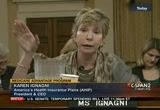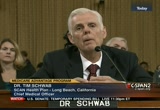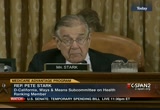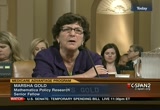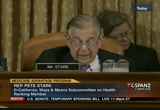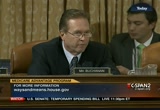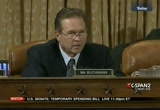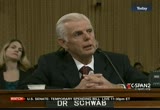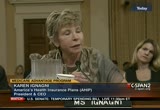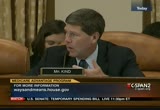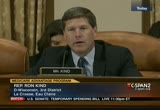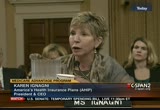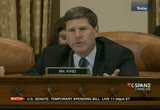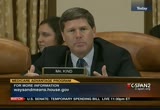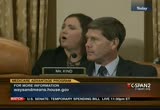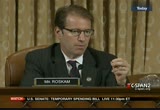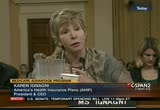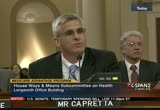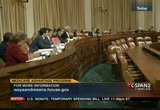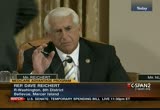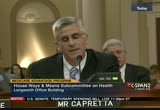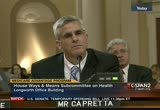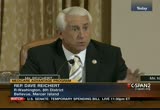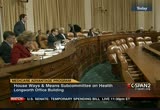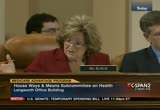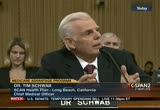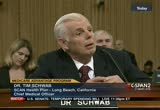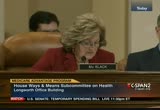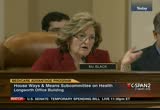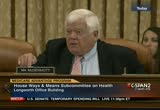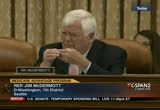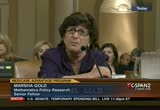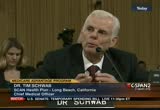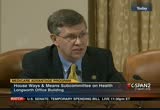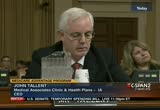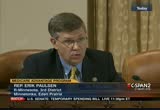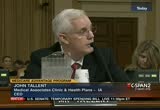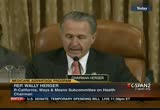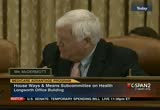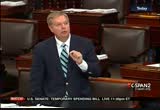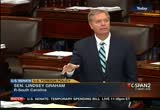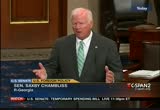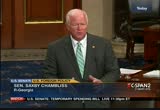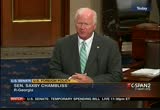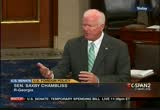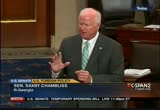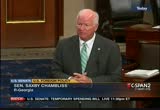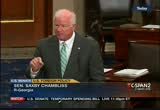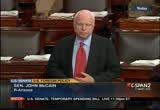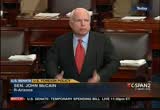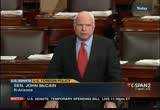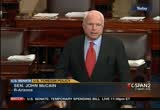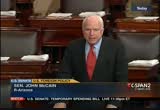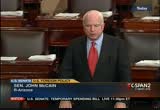tv Close Up CSPAN September 21, 2012 7:00pm-8:00pm EDT
7:00 pm
effect. it was a bipartisan action. with respect to what will happen as a result of the cuts that we see in the dca and also the premium tax which has not been much focused on what needs to be because it begins in 2014 and compounds, i cannot tell you exactly what would happen, but i think the cbo estimates provide no window into that, and we provided that in our testimony. >> thank you. i understand that health had a fully integrated health plan for beneficiaries, many dual eligible for the last 40 years. can you request to halt the planned benefits beneficiaries between medicare and medicaid? one of the benefits of the step of immigration?
7:01 pm
>> yes. stan has had a program that, for some of our members had a contract with the state of california to provide all medicaid or medicare services. so from of members is to employ all benefits are arranged through the health plan, where -- weather metical, medicare, and included are the home and community-based services and nursing-home care as per the metical program. the way we integrate that primarily is to our case manager of program. a 1-on-1 relationship with the member working with, in conjunction with the primary care physician on the medical group that we contract with. >> thank you. >> that you, mr. chairman. i think the panel for their testimony.
7:02 pm
at -- my republican colleagues would like us to believe that the sky is falling in terms of enrollment, benefits, premiums. these projections have turned out to be incorrect, and since passage of the hca medicare advantaged enrollment has increased and premiums have decreased. is that not correct? i am sure that this happened last year so that it just is not a one time event. this is a trend. could you just discussed from moment the distinctions between medicare advantage and the romney ryan voucher war premium
7:03 pm
support program that the republicans would have less -- how did they differ? >> there are so many plans floating around that i will answer generally. but basically under medicare advantage beneficiaries always have the option to return to medicare traditional medicare. they get the same benefits whether they are in medicare advantage of traditional medicare and plans are required to pay those. they have a national medicare program and strong oversight under a premium support program. most of them. there is more wiggle room in the benefits and a lot of them would seem to dismantle the traditional medicare program into a bunch of smaller programs or changes that make the bargaining power nationally much
7:04 pm
more limited with providers. heard it from controlling health care costs. >> also, there are some that would like you to believe that plans are still in because of the quality bonus program. i think most of our estimates show that the accountable care act, affordable care act has reduced medicare advantage over payments by 156 billion as listed in the budget. and the quality bonus payment demonstration is that total of eight and a half billion over two years, so isn't it also true that the underlying quality program will continue in perpetuity?
7:05 pm
>> yes. it is in the law. >> it is possible that the demo is being targeted at the mid-level plan to help them improve before this bonus plan takes over? >> yes. >> thank you very much. >> thank you. recognized for five minutes. >> thank you for holding this important hearing today. i'd like to thank all of our witnesses for taking the time today to do this. i represent about 200,000 seniors who rely obviously heavily on medicare. about 40,000 are on medicare and vantage. i want to make sure they have quality health care. millions of americans are startling, especially living on fixed income. i read a new study in terms of the cuts they're talking about, the $716 billion in cuts in the new health care law, 2 billion will be in the two counties i
7:06 pm
represent in my congressional district. the question that i have for the panel really, how big of an impact in terms of our congressional area? can you may be express your concerns on this were your thoughts on this? >> i apologize, but i don't understand that particular is of florida and your situation. >> just look at the 716 billion in cuts. of that, applicable, and a lot of different congressional districts around the country, but i have to wonder cows and seniors 65 and older. 2 billion of those cuts will be in my immediate area, the area i represent, and i was wondering if you have a fallout on the impact of those cuts. >> i specifically am focusing this morning and have been asked to focus on the effective the --
7:07 pm
>> medicare advantage. >> the cost contracts and the situation that we are in. >> let me just -- do you have any comments on that? in terms of the cuts? >> the cuts are going to force all plan step operate more efficiently and effectively. i think some of the things that the plans are looking at our how do you use technology to more efficiently care for people. ultimately cuts will potentially reduce the amount of benefits if the cuts are deep enough. the other thing that helps is, as we have moved more toward risk adjustment system so that
7:08 pm
you pay appropriately for the appropriate needs of that individual, that can help offset some of the impact of the cut. >> do you have any comments? >> there is no way to know with precision exactly what will happen in any particular area. i do think that looking at what happened in the past, the budget act of 1997, there is reason for caution and deliberation, in particular i think that as we seek the cuts, they have not -- there back loaded, so we have not seen the impact. the premium tax is going to be hitting in 14 has these cuts ramp up, and i think that is a place to start for real deliberation in terms of the impact of all of these things. so without a doubt i think that our plans call and i can tell you, our plans will do everything they can to maintain benefits and service for seniors
7:09 pm
who are depending upon them, but the scale and scope of the cuts that have yet to come is something that we are concerned about. >> thank you, and i yield back. >> thank you. recognized for five minutes. >> thank you. i want to thank our panelists for the testimony today. this is yet another hearing that we're having a was happening within the health care reform which i think is silly necessary and appropriate. we have these have rescissions' and find out what is and is now working and hopefully have the ability as a congress to continue to make adjustments as we learn more. i don't think anyone going into health care reform, certainly those of us to afford the act upon it would be easier happen overnight. it would require a lot of hard work into the effort of a nation, not just one party trying to reform health care system that is in desperate need of reform. i dealt want to get try to do what we can't. a more integrated chemical or knitted patients center, but
7:10 pm
especially we have to change the way we pay for health care so that is now your outcome based in no wonder volume based payments. i know you and the plans that you represent have been at the forefront when it comes to a lot of these changes and a lot of these reforms. we need to be doing it on a parallel path between medicare and the private plans. i do not think doing it in isolation will work. give us a quick update in what you are seeing happening, especially in the private sector with these delivery and payment reforms. >> i appreciate the opportunity to do that. a couple of points. there are very significant changes going on all across the country that are very exciting, and the story is about collaboration, health plans and clinicians, collaboration in patients enter medical homes to bring more value and case management to those with chronic illnesses and making those strategies into medicare advantage, medicaid plans, steps and so on and so forth the show's real promise.
7:11 pm
what you have talked about, really changing, moving to a prospective payment as opposed to retrospective and more of a piece rate. we are beginning to see real attraction as a result of that all of the country. and that holds a real promise. the third point i mentioned in my moral remarks, we are partnering with cms of number of these initiatives. that to holds promise in terms of getting more traction and getting more pickup across the country and a synergistic way. i think you will be hearing more about that, without a doubt what is very significant now has a result of the strategies, health plans are showing in peer-reviewed journal data that they're working with respect to readmission, a emergency, so we are not finished by any means. i don't want to leave you with an impression, but we have taken a major step, and it clearly has to be the future. more coordinated care, prospective payment and partnership between planting conditions in hospitals.
7:12 pm
>> let's back up here a little bit. plans as far as they are concerned. but what i don't understand is, there are two different competing visions of where health care reform needs to go. under the plan, the changes will not happen until ten years from now. abcaeleven 12. i'm sorry, but that's just not good enough. we cannot sit around and wait ten years to start making important changes within the altair's system, especially in a program as important and vital as medicare. there is some criticism appeared about how these moments will be reduced. the medicare modernization act and the new prescription drug plan. is that right to make is that where the plan came from?
7:13 pm
>> there is a predecessor program commonly referred to as the risk program of them back to the 1980's. built upon that. >> de you recall sitting here today whether or not that legislation passed the call for higher reimbursement levels. as a major piece of legislation a large expansion since medicaid was first six tended, not up nickel of it was before. we voted against it and thought it was fiscally responsible for offering these higher reimbursement payments without any ability to pay for it to begin with. arguing for criticism and we're trying to reform that, cost savings, by the way, completely adopted in that budget. every one of my colleagues supported and voted for.
7:14 pm
now they're trying to have it both ways which is inexplicable to me. this school, i think you testified about the differences that there are between their plan that would privatize a premium support order be went to college with the existing medicare program. is there an important this tension to be made? >> seven time has expired. >> recognized for five minutes. >> in your testimony before the government reform committee in july and again today, you know that cms enacted it demonstration that was seven times dodger than any since 1995, greater than the combined budgetary effects of the demonstration, no control group or waited does the of comes of the demonstration program and went so far as to suggest the
7:15 pm
demonstration should be cancelled. is that right? we did recommend. >> you know, president obama during the large discussions around the new health care law made much of the argument that if you like your plan you are going to be allowed to keep it. can you reflect on how the reality is of what your members are dealing with and their ability to offer products that existed before the enactment of the health care law and what they're dealing with now? ..
7:16 pm
from cbo, that gives you a window into the potential effects. and so, the honest answer is we don't know what the future will hold and we are going to work very commit very hard to do our part. sec decides about this that will come into effect, were very concerned. >> at yankee said concerned either two or three times, so let me focus on mr. capretta. if you were advising, ms. ignani, on the nature of perkins turned. if you are there looking than a spreadsheet and making some predictions, what are the things she needs to be concerned about
7:17 pm
it is stated goal of the president of the united states is to be able to offer a program to something currently enjoyed. what would your advice about the nature of the concern? going forward? >> well, she needs no advice for me, first of all. >> well played, well done. >> it's quite clear from the trustees program is going to shrink some of the question is the degree of magnitude. a few make these reductions, the lab required that any team above a bit, but below the benchmark returned essentially to the beneficiary in the form of higher benefits. when you reduce the payments, by definition they will be scaling back what they can offer to the beneficiaries to enroll in the program. >> that is a truism, right? that is not a revelation. >> absolutely. >> trustees project that about one third of the program is
7:18 pm
going to disavow one way or the other. into the plants will close under some beneficiaries will do so because they will be less attractive. and about 60 years time, five years time from the trustee based on actuaries productions will be basically one third more than it is today. for the congressman from florida, 40,000 of them in medicare advantage, 10, 12, 15,000 beneficiaries will lose the plan they have today and move back to the traditional program. i don't do that is a very positive development. before service has advantages and can be an important program, but one has to recognize it is not coordinated care. as frank medicare that doesn't necessarily deliver higher-quality care. >> so your testimony today is the trustees, people involved with this and strikes him as that minute. it's six years come a third of the beneficiaries are going to
7:19 pm
be out of the system. it is your conclusion that one third leaves because of the downward pressure on reimbursement. either they take themselves out, the beneficiaries do, or the carriers no longer participate in the program. is that right? >> that's correct. it shows below that and those are the reasons why. >> i yield back. >> mr. reichert is recognized for five minutes. >> thank you, mr. chairman. i am going to continue this line of questioning that mr. roskam was pursuing with mr. capretta. just to clarify, when the bill was first draft did pass, we were look at a $523 billion cut in medicare. about 200 billion of that was medicare advantage. today coming cbo has upped the
7:20 pm
figure to $700 billion in $308 billion for medicare advantage. is that correct? >> that's correct. >> i am really confused as to what we are supposed to believe because the other question was an mr. roskam touched on it, the president of the united states that if you like your health care plan come you can keep it. but i was at an event with the president came back and said when he was asked that question, well, there may have been language inserted in that bill that runs contrary to that premise. that is a paraphrase of his comments. what are we supposed to believe this to my question. so to follow up, your testimony suggests that the cuts to medicare advantage may force seniors out of the plan daylight and that they currently have. is that true? >> yes, that's true. and then enforcing to less less preferred options like before
7:21 pm
services are listed in the medicare. >> that's correct. >> let's talk about the seniors to lose their plan. is that you medicare trustees expect millions of seniors to lose access to medicare advantage altogether? >> i haven't seen them specify exactly how it's likely to fall out. one can surmise there's 4 million beneficiaries -- pure beneficiaries in 2017 then they will be in 2013. of those 4 million, one might surmise that marin counties for the plan to that marin counties for the plan to. some are in counties where the plants are still there operating. some are in counties where the plants are still there operating, but perhaps less generous benefits and they don't find us attractive and move back for fee-for-service peers of the disarmament and shrinkage is not all that clear yet. >> but there will be this enrollment? >> yes, there will be. >> the mobile to keep their health care going.
7:22 pm
and sooner susana program are going to lose benefits as you just mentioned. >> yes, they will. >> they will be forced back into the fee-for-service medicare, which is not coordinated, does not have the additional benefit that seniors are used to and? any type out-of-pocket maximum. is that correct? >> many may end up trying to buy insurance, which the average premium is 150 or $200 a month, something like that. >> was my next question. as you know, chairman herger and i have been doing investigation into medicare, aarp and its relationship to its involvement in helping to negotiate this obama health care plan. i find of interest team that the promises made, keep your health care if you like it, i seniors leave medicare advantage and they are forced into medigap,
7:23 pm
what happens is for aarp, they end up with a $1 billion windfall over 10 years. the increase revenue by $1 billion in 10 years as a result of that change. aarp gets a flat rate fee for seniors on medicare advantage and a fee -- a percentage of every senior enrolled. i also find it curious that in this though, what we're going to do is we are going to tax people who don't buy insurance. we are going to tax medical devices. we are going to tax people, businesses who don't provide enough insurance with a penalty. russert going $23,000 tax. if you provide too much insurance. then were going to tax 40% -- we are going to tax american citizens over and over and over again. for aarp with a $1 billion -- $1 billion increase in revenue
7:24 pm
in 10 years, is a tax-free organization. it will be not taxed when sent on a $1 billion. and i don't expect you to respond to that. i appreciate the time and i yield back on the mr. >> thank you. >> thank you. ms. black is recognized for five minutes. >> thank you, mr. chairman. i appreciate the panel being here today and helping a to look at what the future of these programs might be for especially the very frail population. and giving a health care background and how it worked in long-term care, and certainly acutely aware of what their needs are. one of things i know is i work with patients over the years is that the no one choice. they still want to make some of those decisions and not feel like he will be told about everything that is going to be done for them. i want to turn to you, dr. schwab, because i believe
7:25 pm
this is an area we need to take a look at. you have both the clinical background and also the background on the economic side of scan, which has been the special needs programs for many years. and so, in your testimony on page six can you talk about the special-needs model providing patient centered coordinated care to vulnerable populations. nec unfortunately as we all know, the current special-needs program authorization is set to expire in 2013, which is a great concern to me. if you could just briefly talk about what you see if you were going to sell this program to a policymaker to make that decision, tell me what you see as being the benefit. and then also, i want to know for neil, what do you see as a possibility of working within the environmental cost, but patient centered care and quality. what kinds of things could you
7:26 pm
do to make the program better and make it more effective? >> well, to start with, what could you do to make it better? there are three different types, see the answers depend on which you're talking about. dual snaps, one of the things that could be improved is better coordinating and reducing overlap of regulatory issues to train the state and federal government. not that one is wrong or one is right. it is just there is confliction and duplicate it forward. what you can do for the overall programs they think is recognized that all snips are people that are very different, whether it is the tools or whether it's institutional.
7:27 pm
and measuring quality specifically for that population would be a big help. the five-star system is a great step forward and measuring quality in plans. unfortunately, it doesn't always apply to some of the unique populations within there. what is good for a person on dialysis may not be the same quality metric you want to measure for a person who is dual anon on dialysis. the other thing is we have shown that providing home and community-based services is very valuable in keeping people in their home, which is where they want to stay and out of a nursing home. allowing plans -- other plants, other than a supplemental benefit would go a long way to especially preventing people
7:28 pm
that are low income but not very spend down and going into a nursing home and ending up on the medicaid program. >> thank you. mr. cosgrove, want to turn to you because i know the gao expanded requirements for the medicare improvements for patients and providers act of 2008. which established requirements for the special-needs program. can you discuss some of the challenges identified in implementing those contracts? the mac we met with five states to talk about some of the challenges and part of it they just explained the terms they used was bandwidth. it is a number of organizations they would have to contract with and the state having the resources to be able to do it. they could see that it is more
7:29 pm
valuable for plans that are larger. some of the snips are fairly small, but still it takes the contracting of her. and they also brought up some other issues as well in terms of the state fiscal year may not coincide with the contracting year for the snap, which causes difficulty for entering into contracts as well. >> you have experience in this particular ratio. do you have any comments regarding this report? >> thank you, mr. mcdermott is recognized for five minutes. >> thank you, mr. chairman. as i sit here and listen to this, i think about the fact that test is the best political defense you have too many people confuse. there's a lot of people watching that don't understand that
7:30 pm
everyone who is speaking on the other side, talking about these awful cut, every single one of them voted twice. so they try to really have it both ways. isn't it true that the aca actually eliminate the cost and gives. is that true, ms. gold? >> ms. gold if you can turn on your microphone. >> yes. >> what is the difference between this voucher plan that the ryan budget wants and this medical plan? i said it appeared as a doctor and i think about patients rather than products and numbers and trends and graphs. i think what it does to patients. so tell me, what is the difference for a patient if they
7:31 pm
are forced into a voucher plan by ryan remain in the regular medicare? >> i think it's a lot more confusing and probably a lot more expensive depending upon how much money congress puts in. right now, beneficiaries know there's medicare. medicare is very popular. 70% of beneficiaries remain to the traditional program and like it. if this goes forward, beneficiaries probably will not necessarily have the same benefits across the country. some may have less. we'll get into more fights about what areas have more money or less money. they will have to figure out whether they pay more money, how these benefits compared to one another and it's likely to be relatively confusing. underappreciated is that your plan may affect what type or you can go to. if every year these plans
7:32 pm
switch, especially if there's different plants coming in and out. it means that beneficiary care may not be stable over time and they may find even if they stay in the same plan they don't have the same doctor or they could lose their dock there. >> when we talk about cuts, everybody here thinks they know what were talking about. i have no idea what the average american thinks when we say we are making cuts in medicare. does that mean they won't take my blood pressure anymore? or does that mean they won't take my blood sugar? or does that mean i won't give physical therapy with my aching bones? what are these cuts? >> you mean under the current program? >> every day, congress decides how much money it's going to spend. it pays providers can decide how much to update the providers rate and that providers rate.
7:33 pm
as i understand the cuts in the aca, most of the general cuts involve those kind of decisions as to what an equitable payment for hospitalized or another provider. so there were changes in provider payments. there is no change made except improvements and benefits are cautionary for beneficiaries. so presumably, there always is a problem if you cut providers to far you could have a problem getting access to them. but i think most of these heads are probably invisible to beneficiaries right now. >> i forgot which one of the witnesses that this pressure on medicare with the cuts is going to make them more efficient. does that mean you won't get good medical care? if it's efficient? >> you know, what sufficiency? it now, --
7:34 pm
>> let me ask dr. schaub or dr. tallent. what do you intend to cut because of these changes in medicare that will make people get out of your program or leave, or is it just that the moral areas are too far away so were not going to get that coverage? were going to drop that count? what does that mean? >> well, i was the one that used the term efficiency. and i think that the first focus is on how to become more efficient and not reduce quality. the quality comes first in all plans and efficiency means you will be cutting administrative overhead that you can find better ways to do things more efficiently and more effectively. that can only go so far, but that is clearly the first area
7:35 pm
we are looking at the cutting. how do we work more efficiently without impacting beneficiary experience? >> the gentleman's time has expired. if there's any further response, if you could respond in writing, please. thank you. mr. paulson is recognized for five minutes. >> thank you, mr. chairman. also for holding this hearing. like many of my colleagues and concerned about pending cuts to medicare advantage program and the likelihood that millions of seniors will be pushed out of the health care plans in the coming years, even though they may like health care plans. mr. tallent, and your testimony pointed out 250,000 medicare beneficiaries could lose access to their cost contract plans unless congress takes some action or steps this year to extend the programmer make modifications to the so-called two plane tests tests. substantial number of those beneficiaries come about 200,000 are in my home state of
7:36 pm
minnesota democrats have been made in the past of the medicare is program, plans have been forced to either scale back offering to withdraw from certain areas of the country altogether. so mr. tallent, from your experience do you agree it's more important now to extend cost contract, that program, given the cuts to the m.a. program slated to take effect now over the next few years? >> well, yes, we think it's important because we are entering another period of instability of no great for the m.a. plans. over history, which has been mentioned a number of times, we have observed these plans making decisions to pull out of certain markets. and that is what we are experiencing them in my testimony i discussed specifically in iowa that we are concerned that we will be displaced next year and there
7:37 pm
could be a very high probability that in the near future, but the plans that are displacing as well also leave and the result will be many beneficiaries without appropriate high-quality options for plans. >> you also mention any cost than enrollees have medical associates health plans another cost contract plans are older than the average of medicare beneficiaries in general and they have been members for a decade or longer for a long period of time. this seems like a potentially vulnerable group to disrupt care for. i would imagine he would agree with that. what does it mean to beneficiaries if they could no longer choose to enroll in the plan did come to rely upon? he talked about the high probability of disruption at losing out to other competitors pull out down the road as well.
7:38 pm
>> for many of our members would be very disruptive. in my testimony i mentioned that 30% of our membership is over the age of 80 and also many of these members have been with us for a very lengthy period of time, have been with the same doctor were set to dock tours. many of them have multiple issues for lengthy periods of time. and if we were to have to be displaced, this vulnerable population would definitely be affected. >> thank you, mr. chairman. i will go back the time and appreciate the testimony. >> thank you. i want to thank each of our witnesses for your expert testimony today. today we heard a detailed discussion of the future of health plans in medicare clearly, significant changes are coming to the medicare advantage program and seniors are right to
7:39 pm
be concerned about what will happen to the health plan they have. as i conclude this hearing, likely my final one is a member of this committee, i would like to highlight that this committee has some of the most challenging issues before it. i want to thank my colleagues for their thoughtful and often spirited discussion of those issues. we have debated these issues honestly and fairly and i've laid down the groundwork to address the issue important to the millions of current medicare beneficiaries and those joining the program in the future. i want to say it has been an honor and a privilege to work with all my colleagues and a blessing to represent a northern california constituents. the work that we do is critical to maintaining a vibrant and thriving nation and i have been
7:40 pm
proud to be a part of it. as a reminder, any member wishing to submit a question for the record will have 14 days to do so. if any questions are submitted, i ask that the witnesses respond in a timely manner. with that -- >> mr. chairman? >> yes. >> may have a point before the chair? >> you may. mr. mcdermott is recognized. >> it is typical of you that she would put this announcement under the thin at the end when there is nobody here except me. we are going to miss you and your 10 a good job for your people in california and for the committee. and i think it should be acknowledged publicly. but members retire sometimes before they are thrown out and it's good to see you going into retirement. i hope you enjoy it. you denigrate service to her country. thank you. >> i think my good friend for
7:42 pm
military force? so i hope my colleagues will come to the floor and resist the temptation to do something that sounds good in a 30-second sound bite. i know people are frustrated and war weary, and i know we're broke, and you would like to just leave everybody else alone, but they're not going to leave you alone. and look how much money we spent after 9/11. look what 20 people can do to this nation if we disengage from the world. so now i would like to ask a question of my colleague, senator chambliss, who is the ranking member of the intelligence committee, and i have asked this of the author: when you wrote this
7:43 pm
amendment, disengaging from libya, egypt and pakistan, which is a nuclear-armed nation, did you ask anybody in the intelligence community -- general david petraeus -- if there was ever a hero in modern times, that's him. have you ever asked him or senator chambliss or anybody else, oh, by the way, i'm thinking about pulling the plug on our aid to pakistan, egypt and libya. what's your view of that? have you been asked that question? mr. chambliss: i thank my friend from south carolina as well as my friend from arizona with respect to the debate that they have been engaged in, for bringing this issue to the forefront, being willing to stand up and say, you know, foreign aid, if you talk about that in a coffee club in seneca, south carolina, or phoenix, arizona, or molte, georgia, is not the most popular topic.
7:44 pm
most people back home think we can balance the budget if we eliminate foreign aid. but the fact is, as senator graham said, it's a minuscule amount in the overall context. right now we're at a critical context with respect to our juncture with respect to any number of domestic, foreign policies. and as we go into the election the american people are going to have a choice to make. we're also at a crossroads with our foreign policy in this country. all you have to do is pick up this morning's paper, turn on the tv today, and you see what's happening in countries that are the subject of this particular amendment. there are tens of thousands of people protesting in pakistan today. there are folks in egypt that are still protesting. there are folks in libya that are still protesting. we're ten days away from the ambassador to libya from the united states of america having been killed. we know that part of the world
7:45 pm
is in a turmoil. we know that part of the world also has been very critical to our fight against the war -- fight in the war on terrorism. and when the president of the united states is asked a question: is egypt an ally, and he can't answer that question affirmatively, that tells you what kind of foreign policy this particular president has. he doesn't know what his feign policy is if he can't tell you whether egypt is an ally. well, let me tell you, in spite of all that's happened in the last ten days -- and all of us still grieve for the loss of four very brave americans who put their life in harm's way as civilians to advocate what's in the best interest of our country. but i would assure you if ambassador stevens was here
7:46 pm
today he'd say the direction which senator paul's amendment is the wrong direction in which to go. i know what the intelligence community thinks about this. i know that the intelligence committee thinks in spite of our problems with pakistan and we've had our overt problems with pakistan over the last several months and couple of years. but the fact is we've got american soldiers in harm's way today in afghanistan who are fighting to protect the freedoms of this country and who are fighting to make sure that we remain the safest, most secure country in the world. and you cannot decouple afghanistan and pakistan. it is very important that we maintain a strong relationship with pakistan, even though it is difficult and even though it is fractured. it's of critical importance that we maintain that relationship. it's important because of what's happening in afghanistan. but it's also very important for another reason. we had a debate in this body
7:47 pm
about a year ago on what's called the start treaty, which is a treaty that we have with russia for the elimination of certain nuclear weapons over a period of time. during the course of that debate, we talked about the elimination of russian nuclear weapons versus weapons in the united states, and that's good to a certain extent. but none of us in this body who have any idea about intelligence around the world have a great fear of any country getting a hold of a icbm, a major intercontinental ballistic missile, sticking it in a sleeve somewhere and shooting it towards the united states. what we do have fear of is somebody getting a hold of what we call tactical nuclear weapons, sticking them in a suitcase and bringing them to the united states or putting them in a position to kill and harm americans. pakistan has tactical nuclear
7:48 pm
weapons. and as long as we maintain a strong relationship with them, as long as they are our ally, however you characterize that, then we have the ability to at least dialogue with respect to -- with the pakistanis with respect to their nuclear program. but even today -- and i'll close with this with respect to that issue. even today with all that's happened over the last ten days and all the condemnation around the world from a democratic country, particularly within the united states, for the condemnation of what's happened and the consternation and appall at what's taking place from the standpoint of demonstrations in pakistan and in libya, the libyan government and the pakistani government have given us all the help that they can possibly give us, particularly in libya. that's a government in transition. it's a temporary government.
7:49 pm
and we need to make sure that the people of libya have the opportunity to hopefully have a democratic form of government one day. if we sever ties with them today, folks, that's over. and we can just make certain of the fact that we have one more territory, one more country where terrorists have the opportunity to be trained to kill and harm americans. with respect to pakistan, the pak government has sent the palace guard to guard the embassy of the united states. that's their most elite troops. our relationship is frayed and it's fractured, but they are doing their level best to try to make sure that the americans that remain in pakistan are protected. and if we all of a sudden decide that we're going to cut them off from financial aid, is that going to improve the situation there? is it going to give us some sort of satisfaction? it may from the standpoint of
7:50 pm
folks who don't like the idea of foreign aid, period. but let me tell you, from a national security standpoint, it is simply the wrong thing to do. there will be one country that will gain from this. the country that will gain from this is the most notorious terrorist-sponsoring nation in the world, and that's iran. iran has a very powerful presence in pakistan today. they want to have a powerful presence in libya. and i assure you that if we cut off the minimal amount of aid that's being talked about with this amendment, then we are simply fostering the ability of iran to have a larger voice and a larger presence in countries that are very fractious and very vulnerable today. so while i, in spirit i agree with my good friend, rand, senator paul, this is not the
7:51 pm
right time in the history of our country and not the right time in the history of the world to take action that is simply not in the best interest of the united states. mr. mccain: mr. president? the presiding officer: the senator from arizona. mr. mccain: in the last few days several interesting things have happened, and some of them tragic. of course, beginning with the tragic loss of our brave four americans and ambassador chris stevens. and then the demonstrations that have taken place everywhere. but also, i remind my colleagues that there was a most sophisticated attack on one of the most heavily fortified installations in iraq. it was professional. it was carried out in a professional fashion. it resulted in $200 million worth of loss to the american taxpayer. the greatest single act of destruction since the tet
7:52 pm
offense back during the vietnam war. in iraq -- in afghanistan, because of the attacks of afghan soldiers on american soldiers, we've had to suspend the operations between the military and police, between the two countries. if there is ever an indicator of failure of our policy in afghanistan, it is our now inability to even train with them to be ready to take over our -- the responsibilities that we now hold. there is no greater indication of the failure of the president of the united states to continue to tell not that we need -- the american people and the people of the world not that we need to succeed, not that we need to win, but that we need to withdraw. and so countries in the region have taken the lesson and have, are making accommodations. the fact is that we are now
7:53 pm
facing a collapse national security policy in the region, beginning, of course, with the assertion by the ambassador to the united nations that what happened with christopher stevens and the three others was -- quote -- "spontaneous." the present spokesperson saying the same thing. we knew it wasn't spontaneous. we know people don't bring heavy weapons and mortars and rocket-propelled grenades to demonstrations spontaneously. this was a well-orchestrated, well-planned, well-executed act of murder of four brave americans. and now we blame it on the video. it's the video. it's not the video. the video is the vehicle of the radical islamists that they used. and don't think there won't be other vehicles. there are people now, i'm sure, all over the world that are
7:54 pm
making videos that muslims may find offensive. i found it offensive when there was a picture that i tha*eu won't even describe -- picture that i won't describe now back some years ago for the national endowment of the arts. we believe in freedom of speech. the first thing we should have said is americans cherish and have fought for these freedoms, including freedom of speech. very briefly, because i know my colleagues want to talk. we've totally failed in iraq. today as we speak, iranian aircraft are overflying iraq to syria and delivering weapons to bashar assad. we were supposed to leave a residual force there. we didn't because then-senator obama, who said that the surge would fail, where he was completely wrong, now has said -- is now celebrating that we're out of iraq. they sentenced their vice president to death. the tensions between sunni shia
7:55 pm
and kurd have never been greater and al qaeda is on the rise in iraq. in the words of general keen, the architect of the surge, we won the war and lost the peace. when is the last time the president of the united states stood up and spoke on behalf of these people? it's impossible for me to understand why the president of the united states wouldn't at least speak out against the murder, rape, torture that's going on and continues on and an unfair atpaoeud with bashar -- unfair fight with bashar assad, and of course every day that goes by more and more al qaeda infiltrate the country. in afghanistan, of course they know we're leaving. of course they are accommodating. the famous story of the taliban prisoner and the american officer and the taliban prisoner
7:56 pm
says you've got the watches. we've got the time. america is believed to be on the decline and weakening. and so mitt romney was right, the statement issued by the embassy in cairo was a semiapology which later the administration itself repudiated. this president does not believe in american exceptionalism. he does not believe in american leadership. and we have just paid a very, very, very heavy price for our lack of leadership. leading from behind is not the role of america in the world, and appropriate lessons are being drawn from that all over the world. i'd ask my colleague from south carolina if he has any more comments? mr. graham: i yield now to
7:57 pm
senator baucus who wishes to speak. mr. mccain: we yield the floor. mr. baucus: i thank my friend from south carolina. i thank the senator from florida. i'll be very brief because i know other senators wish to speak. this last conversation i think is extremely important. northern africa, other arab countries are in a state of flux, to say the least. the arab spring has caused lots of questions and propose found implications that we don't begin to now fathom. if those countries don't have executive governments that have any experience -- they have replaced tyrants who preceded them. these are muslim countries. many of the people who live in these countries feel that other parts of the world are wealthy and they have been put upon. after that, these are countries
7:58 pm
which in most respects have very, very high unemployment. and after that, most of the population, the demographics of these countries are such that close to half of the population are under the age of, say, 25 or maybe under 30, maybe even younger than that. it's a powder keg. and these are countries which really don't have the history and the culture of first amendment freedom of speech that we have. i say all this, mr. president, because i urge all of us on both sides of the aisle to work together. it is an extremely complicated, complex situation. it used to be not too many years ago that politics stopped at the water's edge. it used to be that not too many years ago in foreign policy issues, because they're really nonpartisan, we as a country worked together. we faced the country -- the
7:59 pm
world as one voice. so i strongly caution my colleagues on both sides of the aisle to not make these -- this a partisan issue, that is, u.s. policy in the middle east, especially in this case northern africa but, rather, that we work together. it's so, so important. there's probably a reason why politics used to stop at the water's edge not too many years ago, and that made us -- because it made us a lot more effective worldwide. again, i urge my colleagues not to be too critical of the other side of the aisle. it just gets us nowhere, it's dividing and conquering, and that puts us in a
133 Views
IN COLLECTIONS
CSPAN2 Television Archive
Television Archive  Television Archive News Search Service
Television Archive News Search Service 
Uploaded by TV Archive on

 Live Music Archive
Live Music Archive Librivox Free Audio
Librivox Free Audio Metropolitan Museum
Metropolitan Museum Cleveland Museum of Art
Cleveland Museum of Art Internet Arcade
Internet Arcade Console Living Room
Console Living Room Books to Borrow
Books to Borrow Open Library
Open Library TV News
TV News Understanding 9/11
Understanding 9/11